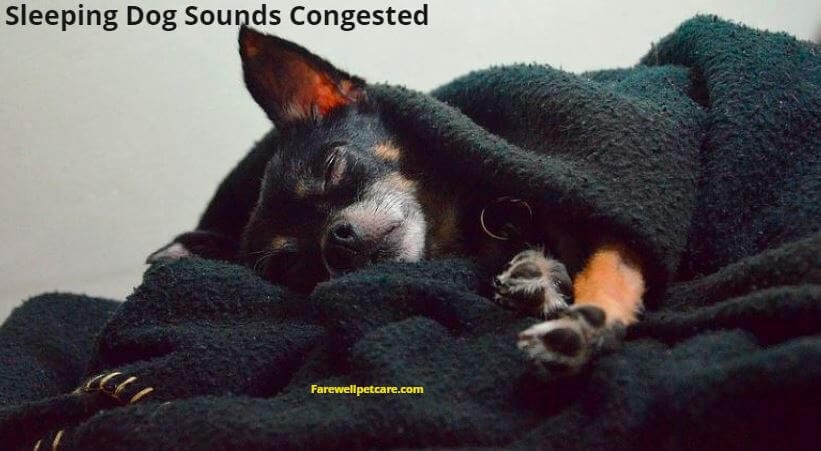Is your furry friend making unsettling noises in their sleep? If so, this might have prompted you to wonder why a dog sounds congested when sleeping. And, is it a cause for alarm?
Your dog may sound congested when sleeping due to inappropriate sleeping positions, obesity, buccal problems, cold, and allergies. Some remedies include using a humidifier, taking the dog for dental checks, and giving the dog lukewarm sodium broth like chicken soup.
Keep reading to find out what you can do to your dog that sounds congested when sleeping to restore normalcy.
Reasons Your Dog Sounds Congested When Sleeping

Listening to your fur baby sounding congested in her sleep can drive you crazy. You may link this situation to dyspnea, a common cause of breathing difficulties in dogs. However, this might not be so if the dog only sounds this way while asleep.
The leading causes of a dog sounding congested when sleeping include:
1. Buccal Problems
Oral pains in dogs, especially mouth stomatitis, can make it hard for your dog to get enough air while breathing. These painful conditions cause the tongue and gums to swell, restricting airflow.
Being the leading cause of snoring and congestion in dogs, mouth stomatitis is displayed through:
- Severe gum inflation
- Receding gums in different locations
- Large sores around the surface of the large teeth
Restricted airflow due to this condition means your canine friend will struggle to inhale and exhale. The consequence is excessive snoring and congested breathing.
Most buccal dog problems result from immune system dysfunction due to an excessive inflammatory response to dental plaque.
Periodontal diseases and cavities that cause inflammation and restricted airflow are also culprits. This is because a dog’s mouth is connected to the airway. Therefore, if the mouth is affected, it also impairs the functioning of the airway, exposing the dog to difficulties in breathing.
You may notice that your dog sounds congested when sleeping if she has a history of oral problems or teeth extractions.
2. Obesity
Being overweight or obese strains the respiratory system, making it harder for your dog to inhale and exhale freely. This can result in snoring and breathing difficulties.
It’s worth noting that obesity is the leading cause of laryngeal paralysis or a collapsing trachea in dogs. These airway conditions cause difficulty breathing and snoring, especially when the dog is asleep.
Obesity in dogs is mainly caused by the following:
- Living a sedentary lifestyle
- Consuming excessive calories
- Hypothyroidism
- Ageing
- Excessive food consumption
To help you figure out if your dog is overweight, the table below shows the healthy weight for some dog breeds:
| Dog Breed | Male Weight (Lbs) | Female Weight (Lbs) |
| Akitas | 100-130 | 70-100 |
| American Eskimo | 25-35 (standard) | 25-35 (standard) |
| Australian Shepherd | 50-56 | 40-45 |
| Australian Terriers | 12-18 | 12-18 |
| Basenjis | 24 | 22 |
| Basset Hounds | 40-65 | 40-65 |
| Border Collies | 30-55 | 30-55 |
| Boxers | 65-80 | 15 pounds less than the male |
| Bulldogs | 50 | 40 |
| Chihuahuas | Not exceed 6 pounds | Not exceed 6 pounds |
| French Bulldogs | Not more than 28 | Not more than 28 |
| German Shepherds | 65-90 | 50-70 |
| Great Danes | 140-175 | 110-140 |
| Pugs | 14-18 | 14-18 |
3. Inappropriate Sleeping Positions

The side sleeper is the most appropriate sleeping position for a dog. In this position, a dog lies on the side while extending its legs. The neck should be elevated slightly, as this helps increase airflow to the lungs.
However, when dogs sleep on their backs or stomachs, their necks drop unnaturally. This compresses the airway and leads to restricted airflow and snoring.
Sleep postures that lead to a flattened neck are prone to increased risk of snoring and breathing difficulties.
If your dog is sleeping in an inappropriate position, wake him up and reposition him on his side. This will help prevent or reduce snoring, making it easier for your canine friend to breathe while asleep.
4. Allergies
Allergies are among the leading causes of snoring in dogs, as they cause inflammation in the nasal mucous membranes.
Inflammed nasal mucous membranes may swell and obstruct airflow, leading to snoring. This may also cause pharyngeal collapse.
Some of the causes of allergies in dogs include the following:
- Dust mites
- Pollen
- Smoke
- Food
- Flea collars
Chronic allergies in dogs can be due to health issues like fungal infections, tumours, and parasitic infections.
5. Cardiovascular Disorders
Heart diseases can affect the lungs and other organs in the body, making it hard for dogs to breathe freely.
Cardiac diseases in dogs, like heartworm infection and congenital cardiac defects, may lead to snoring when sleeping.
Congestive heart failure is common among dogs with cardiac diseases. In this condition, the muscles of the lungs become weak, causing them to collapse while breathing. This leads to snoring and breathing difficulties.
6. Cold
When we catch a cold, we tend to snore and have difficulty breathing. The same happens to dogs when they are exposed to the elements in cold weather.
Environmental factors like windy conditions and low temperatures can cause colds in dogs.
If your dog sneezes or wheezes while sleeping, it explicitly confirms a cold.
The main effect of cold on dogs is that it causes a runny nose that makes it hard for them to breathe freely. A runny nose may also cause a dog to snore and breathe with difficulty.
If your dog has cold-related breathing difficulties, consult your veterinarian for treatment options. Treatment will depend on the severity of the condition; in most cases, the veterinarian will prescribe some medications for your furry friend.
7. Foreign Object Lodged in the Nasal Cavity
Dogs are fond of eating and sniffing foreign objects like small toys, grass, and bones. If a foreign object is lodged in your dog’s nasal cavity, it will restrict airflow and cause snoring while sleeping.
In other cases, foreign objects may lead to the development of abscesses, a painful experience for a dog when breathing.
To prevent nasal obstruction from foreign objects, ensure your dog does not consume anything other than food and water. Also, keep dangerous toys away from the dog to avoid choking.
Ultimately, if you suspect that your dog has a foreign object lodged in its nasal cavity, seek veterinary attention immediately to avoid more complications.
8. Old Age
As dogs age, their lungs also undergo age-related Progression.
Ageing in dogs enlarges and coalesces alveoli, reducing the elasticity and surface area of the lungs. Poor lung elasticity means the dog must breathe heavily to compensate for the reduced lung capacity.
This leads to snoring as airflow is restricted in the nasal cavity.
Moreover, heart disease and other age-related health conditions may also lead to snoring while sleeping.
Although age-related snoring and congestion in dogs are natural, you can minimise them by:
- Feeding your dog a high-quality diet
- Avoiding high-impact activities that can strain the cardiovascular system
- Monitoring and treating age-related health conditions like heart disease and respiratory problems early on.
9. Breed-Related Breathing Problems
Some dog breeds are prone to breathing complications due to their physical conformity. Brachycephalic dog breeds are the worst affected in this case.
“Brachycephalic” refers to dog breeds with short noses or flat faces. These dog breeds have muzzles that seem like having been squashed or flattened inwards.
Their small nasal cavity and oral cavity, as well as narrow windpipe and trachea, restrict airflow. This leads to snoring while sleeping.
Some brachycephalic dog breeds are:
- French Bulldogs
- English Bulldogs
- Boston terriers
- Pugs
- Cavalier King Charles Spaniels
- Boxers
- Shih Tzus
If your dog is a brachycephalic breed, keep it out of heat stroke situations since overheating can also worsen breathing problems in these dogs.
In addition to avoiding overheating, you can minimize breathing difficulties in your dog by:
- Avoiding rough play that can lead to injuries and lacerations
- Monitoring weight gain as obesity in these dogs may also worsen breathing problems.
- Providing high-quality food with minimal fillers and additives to prevent inflammation.
- Seeking veterinary care at the first sign of respiratory issues or snoring in your dog.
10. Smoking Near the Dog
We all know that when you smoke next to another person, cigarette smoke can be toxic and dangerous to their health. Imagine how lousy smoking around a dog can be for its lungs!
If you smoke around your dog regularly, you may notice that it begins snoring while sleeping. This is because the smoke irritates the lungs and trachea, causing inflammation and reduced airflow.
Dogs’ lungs are sensitive to toxins from cigarette smoke, so it is best to avoid smoking around the dog at all costs.
Moreover, you may also want to avoid exposing your dog to secondhand smoke from other people who are smoking around him. This can have lifelong consequences for your dog’s respiratory system and overall health.
Remedies for a Dog That Sounds Congested When Sleeping
You now know the potential reason why your dog sounds congested when sleeping. The remaining challenge is to find effective remedies to help your dog breathe more easily and comfortably. Here are some tips:
Use a Humidifier
A humidifier’s work is to increase the moisture content in the air. A dog that breathes excessively dry air may experience disrupted sleeping patterns due to congestion.
A humidifier can help ease the dog into a deeper, more restful sleep.
You should place the humidifier in the dog’s sleeping area and ensure it works correctly before you use it to prevent accidents.
Monitor Your Dog’s Weight
Monitoring your canine’s weight will help you control obesity. You can do this by measuring the dog’s weight regularly to ensure it’s within the limit in the above table.
To prevent obesity in your fur baby, ensure to feed her healthy and protein-rich foods while limiting starchy carbs. In addition, try to incorporate a lot of exercise into your canine companion’s routine. This will help your pet maintain a healthy weight and prevent breathing problems.
Manage Allergies
You can manage allergies through insect control measures and anti-allergy medications. This helps reduce inflammation, swelling, and other respiratory complications.
You can also remove your dog’s collar and wash her clothes regularly to reduce allergic reactions. This will ensure that your dog breathes easier and snores less while sleeping.
Apart from the above practices, you can invest in an air purifier with a HEPA filter for acute allergy cases. The HEPA filter plays a crucial role in trapping dangerous particles like pollen, dust mites, and smoke. It also traps dander from pets, which can cause respiratory allergies in dogs.
Provide Home Remedies and Medications
You might have used antihistamines at one point to eliminate congestion. The same works for dogs. However, before giving your canine this medication, you should consult a vet for the right dosage.
Apart from medication, chicken broth is an excellent remedy for dogs that sound congested when sleeping. Chicken broth has Essential fatty acids that help repair damaged muscles in the dog’s nasal cavity. Repaired nasal cavity muscles will be strong and ensure the dog breathes normally while sleeping.
Seek Medical Care From a Vet
If your dog sounds congested when sleeping and the above tips don’t seem to work for him, it’s time to seek medical care from a vet. The vet will provide more advanced treatment options, such as an inhaler or bronchitis medication, depending on the underlying cause of your dog’s condition.
Frequently Asked Questions
Should I Be Worried If My Dog Sounds Congested?
You should be worried if your dog sounds congested because it might be a sign of an underlying respiratory infection, allergies, and nasal cavity problems. While these dog congestion issues might not be life-threatening, it’s important to consult your veterinarian to be on the safe side.
Will My Dog’s Congestion Go Away on Its Own?
Your dog’s congestion should clear and go away on its own within 48 hours. If the congestion persists beyond 48 hours. consult your vet as soon as possible to rule out any underlying medical condition.
What Is a Home Remedy for Dog Nasal Congestion?
The best home remedy for dog nasal congestion is steam therapy. Steam therapy for dogs moistens and loosens the mucus in the nasal passages, restoring the dog’s normal breathing.
Final Thoughts
If your dog sounds congested when sleeping, it may indicate respiratory problems. You can address these problems with proper care and monitoring to help your canine companion breathe easily and sleep soundly.
You must consult a canine veterinarian to help address issues with a dog that snores when sleeping. The problem might be due to a severe issue like a lung infection that needs urgent medical intervention.

